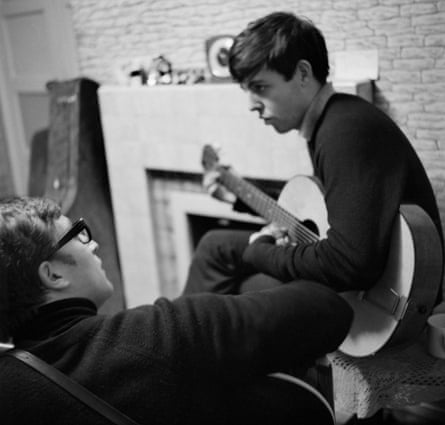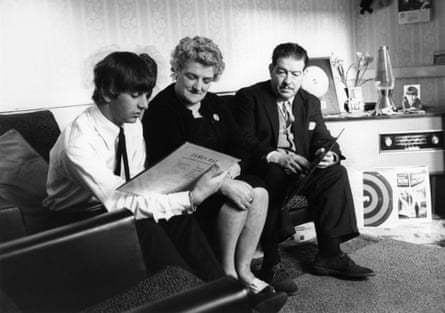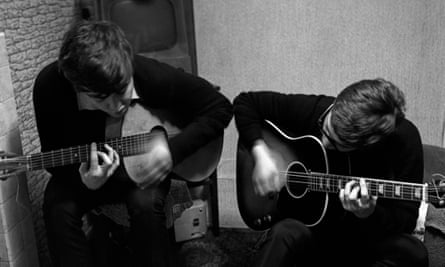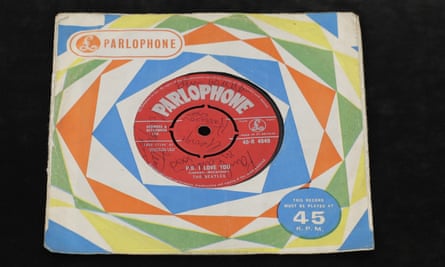‘I sang to it with a plastic guitar when I was three years old’
Joe Elliott, Def Leppard
I was three years and two months old when Love Me Do came out, but I had a plastic toy guitar and whenever the song came on the radio I would stand on a stool and sing along. I don’t know why that song more than any other would leap out at me, but it was the first song I ever sang. It might have been the harmonica intro – the only other song I remember with a harmonica break back then was Frank Ifield’s I’ll Remember You – but Love Me Do was head and shoulders above Freddie and the Dreamers or Gerry and the Pacemakers or any of those bands with similar accents. Lennon and McCartney’s voices weren’t swathed in reverb like records were then, and their sense of melody was phenomenal. In terms of what they did later, Love Me Do is the bit that gets jettisoned once the rocket is in orbit, but it was vital to the whole process. It still makes me smile when I hear it and I take enormous pride in thinking that it was the launchpad for me.
‘It felt like a spiritual awakening’
Lulu
When I was 13 we were obsessed with the radio in the way kids now are obsessed with TikTok. When Love Me Do came on it blew my mind. My teenage hormones were raging, and the Beatles looked so cute, not at all threatening. Before them, most British music had seemed like a lightweight copy of American records, but Love Me Do felt like a spiritual awakening. I’d heard Big Mama Thornton singing Hound Dog and Barrett Strong doing Money (That’s What I Want). Love Me Do was clearly influenced, but different. The three-part harmonies reminded me of the sort of thing you’d hear in church, deep soul. They also wrote the songs themselves, which revolutionised the music industry worldwide. They sang as teenage boys spoke – the language of love, the torments, the heartbreak and the hope. With Love Me Do, they took the beat from black American R&B music and encompassed it in something original. Two years after it came out they were on Ready, Steady Go. When John [Lennon] was asked what his favourite new release was and he went “Shout by Lulu”, I thought I’d died and gone to heaven.
‘It didn’t seem like proper English. I just thought: “Whatever this is, I love it!”’
Michelle Phillips, the Mamas and the Papas
I couldn’t think of any other records in the Top 40 that had Love Me Do’s interaction between two guys, and the phrase “love me do” didn’t even seem to be proper English. I just thought: “Whatever it is, I love it.” They were a huge inspiration to us. In 1966 we were supposed to go and see them at the Dodger Stadium, but then we were told it would be unsafe for us to go because we’d get mobbed and security would have their hands full with the Beatles. I dropped my fork and cried.
‘When they sat down with guitars something unique came out’
Gilbert O’Sullivan
Prior to the Beatles, every band had a lead singer, but John and Paul were two singers upfront. They’d embraced everything – all the great music coming out of the US, R&B, even music hall – but when they sat opposite each other with guitars something unique came out. Strangely enough the odd phrase “love me do” is in the first Cliff Richard film, The Young Ones. The Beatles got the idea of a prominent harmonica riff from Bruce Channel’s [1961 single] Hey Baby, which influenced John. Love Me Do is simple but effective. It’s still a great record but a few weeks later they went in the studio again to do Please Please Me. George Martin said: “You’ve just made your first No 1.” Then they just took off.

‘John and Paul had lost their mothers – you can hear the melancholy’
Rickie Lee Jones
I watched the Beatles on the Ed Sullivan Show on a little black and white TV at my cousin’s house. Everything about that moment is imprinted. The family were cooking chicken and Rice-A-Roni. They made Americans want to be British. We dressed like them and even learned to talk like we were from Liverpool. In the US, Love Me Do wasn’t the first single like in the UK. I associate that record with going to the fair, by which time you’d hear the Beatles everywhere. The harmonica was so haunting, as were the harmonies. John’s lower harmony – “Love, love me do, you know I love you” – drones under Paul’s and then when he sings “Someone to love, somebody new” it’s so plaintive and spooky. I think as musicians they had an emotional vocabulary right away. John and Paul had lost their mothers in their teens, that would give anyone a natural melancholy which would surface in the music. Love Me Do is sad and wonderful. That song gathered up the spirit of the time – the direness and darkness of England at the start of the 60s – and they made a new galaxy out of it.
‘I didn’t know what to make of this odd little song’
Gene Simmons, Kiss
When my 13-year-old ears heard Love Me Do, I didn’t know what to make of it. The instrumentation was sparse: harmonica, two guitars, bass, drums. American pop hits were produced with lots of background singers, horns, violins and percussion, and yet, the song had a familiar ring to it. Years later, I recognised the homage to the Everly Brothers’ approach to harmonies. Love Me Do wasn’t earth shattering in the way She Loves You and I Want To Hold Your Hand would be. The lyrics were simple rhymes of “do”, “you”, and “true” but this odd little song grabbed me.
‘It made my mum comb her hair into a Beatles look’
Paddy McAloon, Prefab Sprout
I was five years old when Love Me Do was released, but I have documentary evidence of the effect they had on our corner of northern England. It’s a small black-and-white photograph taken in the early 60s. It’s bedtime, my little brother Martin and I are in our pyjamas. Our mother – Mary – has combed her hair forward, imitating a Beatle look, and we’re all strumming on pots and kitchen pans. Everyone is grinning.
Lyrically they were never more basic. I believe the song may belong to that period when, as McCartney once told me himself, he and John would write opposite each other, sitting on a bed, singing quietly to one another. From the outset, Lennon seemed to have an electrical charge in his voice, a very mysterious gift. Paul’s voice was pretty, like his face. But Love Me Do was just the first stage of a rocket that still won’t come down.
‘It had the same directness as folk music’
Judy Collins
Beatlemania was an interesting counterpoint to the [1960s] folk revival, because their music had the same directness. Songs such as Love Me Do or In My Life were usually no more than three minutes long and came from the heart. Anyone could pick up a guitar and learn them. My song Sky Fell was very influenced by Love Me Do’s succinctness. The phrase “love me do” itself is short and sweet: it would get somebody off the bar stool and into their arms very quickly.
‘It’s somehow a very modern record – it starts with a beat and a catchy refrain’
Ian Broudie, Lightning Seeds
As a songwriter, there’s a magic about the Beatles because they broke the rules of songwriting and then they became the rules. Love Me Do doesn’t sound like anything else – even the Beatles after it. They’re at their most cautious but it’s somehow brilliant, more than its parts. It’s a very modern record, because it starts with a beat and a very catchy refrain, and the chorus comes in before the verse. It’s so clear it’s like clean air, really refreshing 60 years on. That’s why 18-year-old kids are still obsessed with their records, not as dusty museum pieces but as throughly modern sounding creations with guitars that sound amazing.
‘Ringo is a key part of Love Me Do’s creative DNA’
Steve Jordan, drummer for the Rolling Stones

On the original demo of Love Me Do featuring Pete Best on drums, the tempo is so slow it comes across as a melancholy country song. By the time the Beatles recorded the original 1962 Parlophone single version, Ringo had joined. He thinks like a composer, so he picked up on the hook from the guitars and accentuated it on drums, and the song developed. However, George Martin – who was new to making pop records – wasn’t happy with the drums. Ringo had only just joined the band and unlike the others had no studio experience. In those days everything was played live against the clock so John and Paul’s performances were not brilliant either. A week later, they recorded it again. Martin’s assistant, Ron Richards, called a session drummer, Andy White, and Ringo played the hook on tambourine. This is the version [initially released on the Please Please Me album, then as the US single] everyone knows today. It’s faster, the vocals are better. The drumbeat is executed better, but it’s still Ringo’s and he is part of Love Me Do’s creative DNA. Over the course of the three versions, it becomes the joyous debut we know today. Shortly afterwards, Ringo got the Ludwig kit he’s famous for, got the sound he wanted and the rest is history.
‘It has a peculiar longing that, as a queer person, I could relate to’
Caleb Nichols, singer-songwriter
I was 11, poor and living with my single mother in a rural, very religious part of California, where to come out as gay would have meant people trying to send me to conversion practices. I think my mom understood on some level that I was having issues, and gave me the Beatles compilation Past Masters. Suddenly, I didn’t feel so alone. Love Me Do was track one, side one. I played it so loud I could feel the sound of it. The two voices drew me in, and the feel of those guitars and drums. They were probably writing from the perspective of being teenagers, but it had a peculiar longing that I could relate to. There were a lot of queer people in their circle, not just [manager] Brian Epstein – they loved Little Richard and were interested in the concept of the other. I reference Love Me Do in my song Ramon and have a song called Listen to the Beatles as a “thank you”. I’d listen to them and know these guys were in my corner.

‘The bass made you waltz around the room’
Tjinder Singh, Cornershop
I encountered Love Me Do aged eight when I was given the auspicious role of conducting music as the whole school entered assembly. Up with the baton … and down with the play button on the cassette machine. The harmonica was high in the mix like a fog horn, the vocals – even with accompanying backing vocals – sounded so intimate. The bass made you waltz around the room. The stops and starts are there to keep you on your toes. All the sweat of US gospel and country mixed with the sweat of small clubs and everything that Europe can give had led up to this moment.
‘It’s the baby step on the journey of genius’
Andy McCluskey, OMD
I see Love Me Do as an apprentice piece in the way carpenters used to have to make a small set of drawers before they could make a larger cabinet. It’s the baby step on the journey of genius. The harmonica part is one of the stronger elements, but the songwriting is in its infancy. The ploddy G, D, C, G, D, C, G baseline is nothing compared to the melodic counter harmony bass lines McCartney would write just a year or two later. There are four verses of the same lyric and the only break is when they get to “Someone to love …” and change chord. Having said all that it’s hideously catchy and it’s the first time you hear the dual lead vocal. The singles that followed were genius, so for me Love Me Do is the John the Baptist single that speaks of others to come.

